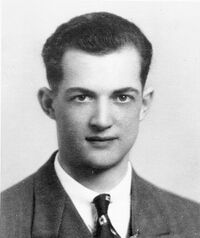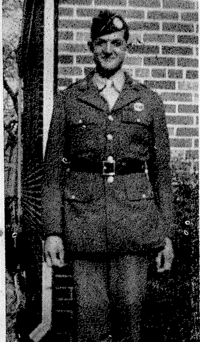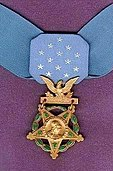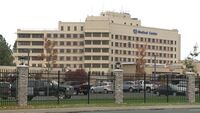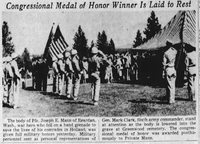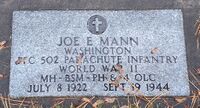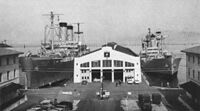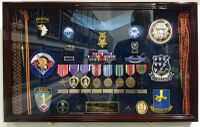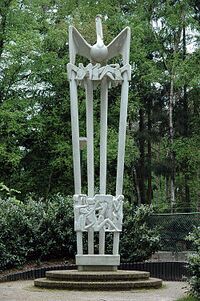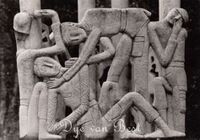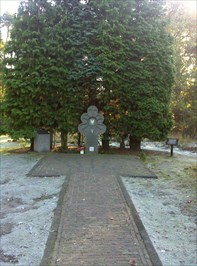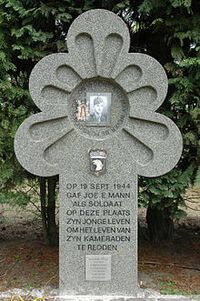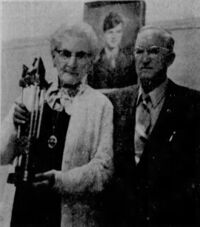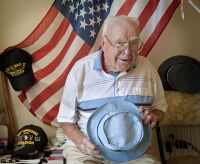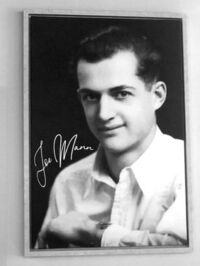Joe E. Mann
November 17, 1938 Davenport Times-Tribune
C. E. Perryman, Smith-Hughes instructor, accompanied his potato judging team to Pullman, Saturday, for the potato judging contest. With twenty teams judging, the local team placed tenth. The team includes Allen Wendlandt, Earl Hein, and Joe Mann. Alternates are Dale Rupnow and Tom Postlewaite.
Mr. and Mrs. Frank Rowland, Mr. and Mrs. Paul Rinker, Mr. and Mrs. John Brommer, Mr. and Mrs. Roy Plaster, Mrs. and Mrs. V. F. Denson, Mr. and Mrs. L. B. Beavers, Mrs. Henry Mann and Joe Mann attended a public card party in Edwall, Saturday night. Mrs. Brommer and Mr. Beavers brought home the first prize in contract bridge.
March 6, 1941 Davenport Times-Tribune
The Luther League voted to attend the midweek evening Lenten services instead of holding regular meetings during Lent. It is also participating in a local and Federation Reading contest during Lent. One team is led by Zelda Sprinkle, Roger Mahrt and Richard Foland, the other by Marjorie Wegner, Joe Mann, and the pastor [Karl Ufer].
May 22, 1941 Davenport Times-Tribune
Reardan Seniors Graduate Tues.
Commencement exercises for the Reardan high school senior class were held Tuesday evening in the school auditorium there. Twenty-nine seniors received their diplomas. Class includes [parital list]: Peggy Beattie, Lloyd Carstens, Jack Delamater, Ross Edwards, Jack Fleming, Earl Hein, Carl Koeller, Quintin Landreth, Dorthy Lundgren, Patricia Mahoney, Joe Mann, Howard McCain, Lorene Neilson, Olivine Owens, Elaine Rowland, Dale Rupnow, Zelda Sprinkle, Betty Stevenson, and Irene Wegner.
The commencement program was:
- Processional, orchestra
- Selection, Quintin Landreth
- Presentation of Gift, Ross Edwards
- Panel discussion "Vocation and Education, Howard McCain, chairman
- "The Effect of Changing Social Conditions on Vocational Education," Dorothy Lundgren
- "The Effect of Increasing Use of Machines on Vocational Education," Joe Mann
- "Vocational Training Received in Public Schools," Irene Wegner
- "The Effects of a College Education in Securing a Better Vocation," Earl Hein
- "Vocational Education in the Reardan High School," Zelda Sprinkle
- Selection, orchestra
- Presentation of the class, Superintendent H. P. Olson
- Presentation of diplomas, Thomas A. Landreth
- Dedication, senior girls sextet
- Selection, Quintin Landreth
- Benediction, Rev. Karl Ufer.
October 2, 1941 Davenport Times-Tribune
Joe Mann, son of Mr. and Mrs. Henry Mann was taken to the Sacred Heart hospital in Spokane Sunday where he underwent an emergency operation for appendicitis. He is reported to be coming along nicely.
[Some others from Reardan who had appendectomies during the war years were: Joe Cox, Ralph Williams, Roy Koeller, Bill Anderson, Harry Garber, Roy Weipert, Harriet Mahrt.]
September 3, 1942
Reardan Youths in Army Service
Joe Mann, son of Mr. and Mrs. Henry Mann, enlisted in the army and reported at Camp Lewis Monday. [At the time Joe was working for the Boespflug Construction Company in Renton who had a contract to build 690 dwelling units for Yessler Terrace in a little over a year. It is not known what project Joe worked on, as the company was a large government contractor.]
October 8, 1942 Davenport Times-Tribune
Joe Mann, son of Mr. and Mrs. Henry Mann, who is with the armed service, has been assigned to a parachute troop and was moved from Fort Lewis to Toccoa, [Georgia].
November 19, 1942 Davenport Times-Tribune
Joe Mann, son of Mr. and Mrs. Henry Mann, who is with a parachute troop at Camp Toccoa, Ga., writes that hes been promoted to corporal. [believe this is private first class based on other sources.]
December 17, 1942 Davenport Times-Tribune
Joe Mann, son of Mr. and Mrs. Henry Mann, who is with a parachute unit, has been transferred to Fort Benning, Ga.
July 29, 1943 Davenport Times-Tribune
First Lieutenant Roy Mann, who is a pilot with the American air forces overseas, writes his parents that he has been transferred from England to north Africa.
Private First Class Joe Mann, who is with a paratrooper division, has been sent to Camp Bragg, N. C. from Camp Mckall, N. C. Both boys are the sons of Mr. and Mrs. Henry Mann and graduated from the local high school.
April 20, 1944 Davenport Times-Tribune
Captain Roy Mann, pilot with the air forces in Italy, writes his parents, Mr. and Mrs. Henry Mann, that he is now at a rest camp at the Isle of Capri. Captain Main received his wings at Victorville, Calif., nearly two years ago and has served in England, North Africa, and Italy.
Another son of Mr. and Mrs. Mann, Aviation Cadet Jack Mann, has been transferred from the University of Denver to Santa Ana[, Calif.,] for further training.
A third son, Joe Mann, is with the paratroopers in England. The boys are all graduates of the local high school.
June 22, 1944 Davenport Times-Tribune
Mr. and Mrs. Henry Mann also received a letter this week dated May 31 from their son, Joe Mann, a paratrooper stationed in England, stating that he had recently undergone a minor operation.
[This operation, to his back, prevented him from participating in the D-Day invasion.]
September 7, 1944
Private George Koeller, son of Mr. and Mrs. Emil Koeller, writes that he has joined the paratroopers in England and is stationed only 12 miles from Joe Mann, son of Mr. and Mrs. Henry Mann. He was formerly in the infantry and arrived in England about two months ago.
October 19, 1944
Tell Joe Mann Killed in Action
Mr. and Mrs. Henry Mann had word Wednesday from the war department that their son, Joe Mann, had been killed in Holland on September 18. Joe is the first serviceman from this district to be killed in action. He was a graduate of the Reardan high school[ in 1941]. His brother, Captain Roy Mann, completed his missions over Africa, Sicily and Italy and is now at Chanute Field, Ill. Another brother is an aviation cadet at Gardner Field, Calif. Besides his parents and two brothers surviving are three sisters, Mrs. Eleanor Meyers, and Helen Mann, Spokane, and Irene at the home; three brothers, Francis Mann, in Washington, D. C., Harold and Donald at the home.
[More details of the battle are at: http://www.ww2marketgarden.com/battleatbest101stairbornedivision.html. Joe Mann is mentioned several times. Lt. Col. Cole also died in this battle. He had already been awarded the Congressional Medal of Honor. He and Joe were the only two so honored from the 101st airbourne division during World War II. Another version of Joe's story is there as well with links to the movie made by the army: http://www.ww2marketgarden.com/pfcjoeemann.html
October 26, 1944
Memorial Rites for Joe Mann
Memorial services, conducted by Rev. Edward Wagner, were held Sunday evening at 8 o'clock in the Emmanuel Lutheran church for Joe Mann, who was killed in action in Holland on September 18.
He was the son of Mr. and Mrs. Henry Mann and was a paratrooper with the infantry.
The church was filled to capacity. Those attending from out of town were Mr. and Mrs. Ernie Myers and Miss Helen Mann of Spokane, Aviation Cadet Jack Mann, Gardner Field, Calif, his wife of Denver, Colo., Mr. and Mrs. Charley Mann, Mr. and Mrs. Howard Mann and son of Cheney.
March 1, 1945 Davenport Times-Tribune
Purple Heart Awarded Posthumously
Mr. and Mrs. J. H. Mann of Reardan have received the Purple Heart medal awarded posthumously to their son Private First Class Joe E. Mann, a paratrooper. He was killed in action in Holland in September, 1944 at age 23 years. He lies in rest in southwest Holland.
September 27, 1945 Davenport Times-Tribune
Congressional Honor Medal Awarded Joe Mann of Reardan
A congressional Medal of Honor, the nation's highest military award, was given posthumously to Private First Class Joe E. Mann of Reardan by Col. A. B. McKie, commanding officer at Baxter hospital, in formal ceremonies held in Spokane, Saturday. His father, John H. ["Henry"] Mann, received the award.
Before a color guard, Col. McKie placed the medal around the neck of Mr. Mann and Capt. P. W. Ohl read the citation which said:
"On September 18, 1944, in Best, Holland, Pfc. Joe E. Mann's platoon, in attempting to seize a bridge across the Wilhelmina canal, was surrounded and isolated by enemy forces greatly superior in personnel and fire power.
"Acting as lead scout, Pfc. Mann crept to within rocket launching range of an enemy artillery position and in the face of heavy fire, destroyed an 88mm gun and an ammunition dump. He remained exposed, and with his M-1 rifle killed the enemy, one by one, until he was wounded four times."Taken to a covered position, he insisted on returning to his forward position to stand guard during the night. The enemy attacked in the morning and a hand grenade landed with in a few feet of Pfc. Mann. Unable to raise his arms, which were bandaged to his body, he called 'grenade,' threw his body over the grenade and, as it exploded, died.
"His outstanding gallantry, above and beyond the call of duty, and his magnificent conduct were and everlasting inspiration to his comrades for whom he gave his life."
It was the first such ceremony to be held at Baxter hospital or this area during World War II, as the presentation is usually made by the President of the United States in Washington, D. C. Besides Mr. and Mrs. J. H. Mann, Lt. and Mrs. Jack Mann, Frank Mann, Mrs. Eleanor Meyer, Capt. Roy Mann, Harold, Helen, Irene and Donald Mann, all survivors, were present.
[The Baxter hospital was near the present day site of the Mann-Grandstaff VA Medical Center.]
June 9, 1949 Spokesman-Review
Last Rites Held for War Hero
Full Military Honors Accorded Pfc. Joseph E. Mann
Pfc. Joseph E. Mann, whose heroism was recognized by award of the congressional medal of honor and the French croix de guerre, was buried at Greenwood cemetery yesterday following graveside rites.
In honor of Private Mann, Gen. Mark Clark, Sixth army commander, sent as his personal representative Brig. Gen. Loyal M. Haynes, commander of the Second artillery division at Fort Lewis. The body was escorted to Spokane by Sgt. Edward E. Siler Jr., veteran of 165 days of continuous combat duty in the Philippines.
Members of the American Legion post 113 of Reardan, Joe's home formed a guard of honor. Glen Oehlschlaeger read the Legion service, including the citation won by Private Mann.
Served as Paratrooper
A paratrooper with the 502d parachute infantry of the 101st airborne division, Private Mann sacrificed his own life to save this comrades.
Acting as lead scout when his patrol attempted to seize a bridge over the Wilhemina canal, Private Mann, advanced to within rocket launching range of the enemy artillery position, In the face of heavy enemy fire he destroyed an 88-mm gun and ammunition dump, remaining in an exposed position to shoot the enemy one by one with his M1 rifle.
He refused to quit until he had been wounded four times, and then with both arms bandaged to his body, insisted on returning to the front to stand guard. When morning found the enemy launching a concerted attack, a hand grenade was thrown within a few feet of the Reardan soldier. Unable to warn his comrades by waving his arms, he shouted "Grenade!," then fell on the missile to protect his patrol.
The Rev. Edward Wagner of Emmanuel Lutheran Church of Reardan officiated at the services.
Flag Given Mother
"In 1944, in another land (Holland), while his comrades stood with bared heads, services were read and prayers said for Joe Mann, whom we honor today. We have gathered today to rebury Joe in the soil of the land for which he laid down his life. The nation has honored Joe by its highest hone, the congressional medal of honor. We meet that we may add our tribute of love to that of the nation," the Rev. Wagner said.
Throughout the service pallbearers held the American flag over the bronze casket. Later, it was folded n triangular shape and presented to Private Mann's mother.
Survivors are his parents, Mr. and Mrs. J. H. Mann, Reardan; five brothers, Francis Mann, Maryland, Capt. Roy Mann, Ohio, and Jack, Harold, and Donald Mann, all of Reardan, and three sisters, Mrs. Ernest Meyer, W3514 Garland, Mrs. Irene Bennett, Cheney, and Helen Mann, Reardan.
Memorials for Joe Mann
Pfc. Joe E. Mann
1922-1944
Congressional Medal of Honor, Bronze Star, and Purple Heart
Joe Eugene Mann was born July 8, 1922 in Reardan, Washington, and gave his life on September 19, 1944 in Best, Holland.
He entered the U.S. Army Company H, 502nd Parachute Infantry, 101st Airborne Division "Screaming Eagles" achieving the rank of Private First Class.
Operation MARKET-GARDEN began in September 1944, during the Allied thrust into northern Europe. Operation MARKET was the airborne phase of the assault with operation GARDEN being the ground attack. The goal was to cross the Rhine River and breach the German Wet Wall defenses. The Dutch countryside crisscrossed with dikes, drainage ditches, rivers, and canals would prove difficult to traverse if the ground troops could not advance by road. For the plan to be a success the paratroopers had to keep the roadway and the bridges along the route intact and secure.
The planes carrying the 101st encountered heavy anti-aircraft fire as they approached their targets, but the pilots were able to deliver the paratroopers to the correct drop zones. The 502nd 's mission was to guard the regimental drop zones and to capture the road bridge over the Dommel River at St. Oedenrode. Additionally the regiment was ordered to dispatch a company to the south of Best to capture the bridges that crossed the Wilhelmina Canal. The 502nd completed its assignment of securing St. Oedenrode and the bridge over the Dommel river. In the days following the link between the airborne and ground forces, the 101st, now in defensive positions, faced enemy counterattacks as the Germans attempted to ct the road and stop the northern flow of the Allied forces.
Pfc. Mann in Best, Holland, single handedly destroyed an enemy emplacement and continued to fire on the enemy from an exposed position until being wounded. Despite his wounds, the insisted on serving guard duty during the night. The next morning during an enemy attack, Pfc. Mann smothered the blast of a hand grenade with his body, sacrificing himself to protect those around him. For these actions, he was posthumously awarded the Congressional Medal of Honor, the military's highest decoration, on August 30, 1945.
Private First Class Mann's official Medal of Honor citation reads:
"He distinguished himself by conspicuous gallantry above and beyond the call of duty. On 18 September 1944 in the vicinity of Best Holland, his platoon, attempting to seize the bridge over the Wilhelmina Canal, was surrounded and isolated by an enemy force greatly superior n personnel and firepower. Acting as lead scout, Pfc. Mann boldly crept to within rocket-launcher range of an enemy artillery position and in the face of heavy enemy fire, destroyed an 88mm gun and an ammunition dump. Completely disregarding the great danger involved, he remained in his exposed position, and with his M-1 rifle, killed the enemy one by one until he was wounded 4 times. Taken to a covered position, he insisted on returning to a forward position to stand guard during the night. On the following morning the enemy launched a concerted attack and advanced to within a few yards of the position, throwing hand grenades as they approached. One of these landed within a few feet of Pfc. Mann. Unable to raise his arms, which were bandaged to his body, he yelled "grenade" and threw his body over the grenade, and as it exploded, died. His outstanding gallantry above and beyond the call of duty and is magnificent conduct were an everlasting inspiration to his comrades for whom he gave his life,"
JOE
By Irene Mann Bennett
Joe is known as a brave Screaming Eagle,
Esteemed for his gallantry in war,
Memorial, honors, and medals
From the nation he was fighting for.
Yet Joe is remembered also as the tousled-haired lad with a grin, as the boy toting wood for his mama, and following in his daddy's footsteps, learning the skills required on a farm. From an early age Joe could be located by the sounds of hammer and saw coming from the shop. He created numerous items, including toys for his younger siblings and a study desk for his room. Before his home had electricity, Joe fashioned crystal radios for each bedroom of the house.
As a high school student, Joe involved himself in debate, drama, and sports. Football became is passion. He throw his heart and his entire body into the game, resulting in a broken shoulder. Downplaying the injury, he pleaded to return to the field to finish the game. Joe's courage was evident when the church obtained a large cross to install on the steeple. He volunteered to scale the spire and crown it with the cross. Spectators gathered, astounded at his ability and agility.
This monument was Erected and Dedicated on October 14, 2008 by the Fairmont Memorial Association in cooperation with the Spokane Police Department History Book Committee, the Spokane Law Enforcement Museum, and the family of Joe E. Mann.
August 16, 1956
Dutch Raise Tribute to Reardan Trooper
The citizens of Best, Holland, have erected a permanent memorial to Joe E. Mann and the 504th parachute infantry regiment. Joe was the first paratrooper from the Inland Empire killed in action in Holland during World War II.
His parents, Mr. and Mrs. J. H. Mann, Reardan, Wash., wheat ranchers, will attend the dedication of the Joe E. Mann theater at Best.
Heroism a Symbol
The townfolk belatedly learned the story of the regiment and the part played by Joe in the liberation of Best. "What struck us above all is the episode of Mann's courageous self-sacrifice," city officials said. "For us his heroism has become a symbol for all that the allied forced have gone through for our sake and for the liberation of this Holland."
Mann was born July 12, 1922, at Reardan. He was 22 when he died September 18, 1944.
Joe was 20 when he enlisted. The parents said he wanted to be a fighter pilot, but a shoulder injury kept him from passing the physical examination. The father said the son decided on the paratroopers.
Written Permission
"We gave written permission," Mann said. "Joe was under age when he wanted to join up."
Joe graduated from Reardan high school. Joe loved sports and played football and baseball.
"On the ranch he learned to do everything," Mann said. "He could run the machinery and he was a good mechanic."
Joe was posthumously awarded the Congressional Medal of Honor. The story of Joe's heroic action was contained in detail in "Rendezvous With Destiny," the story of the 504th.
Man was acting as lead scout on the September 17,1944 battle, and crept within rocket range of te enemy artillery positions and in the face of heavy fire, Joe destroyed an 88-mm gun and an ammunition dump.
Four Times Wounded
The 504th was engaged in combat in the vicinity of Best. Joe's platoon was attempting to seize the bride across the Wilhelmina canal. The outfit was isolated by an enemy force "greatly superior in personnel and fire power," the citation said.
Joe remained in his exposed position until he was wounded four times while inflicting heavy casualties on the enemy. Later, he insisted on returning to stand guard.
The enemy launched a concerted attack on the morning of September 18 and advanced to within a few yards of the platoon's position. Throwing hand grenades, the enemy approached. One landed close to Mann.
Unable to lift his bandaged arms that were taped to his sides, he yelled "grenade," and threw himself over the explosive and as it exploded, died.
His body was returned to Spokane. He is buried at Greenwood cemetery.
A youtube video of the dedication is at: [1].
October 19, 1972 Davenport Times
Joe Mann Day Celebrated by Large Crowd in Reardan
That is exactly what it turned out to be Saturday, when after months of planning two Dutch visitors were able to appear before the entire Mann family and the people of Reardan in honor of a memorable and historic event that dates back to September, 1944, and a turning point in World War II. Arriving Thursday from Best, Holland, Kees Wittebrood and his 22-year old son Herman, were cause for a community-wide reception announced earlier, but it was they who disclosed the real reason with their surprise gift at least for Mr. and Mrs. Henry Mann who had not been told anything in advance except that their guests were here to return their visit and get acquainted with others of the Mann family.
"Much of it was arranged by the Rev Phil Falk, pastor of Emmanuel Lutheran Church of Reardan of which the Manns have been long-time members. He also served as master of ceremonies at the three o’clock program which drew a packed crowd estimated at 350 persons, to the multi-purpose room of the Reardan grade school. Things began happening in rapid succession following the landing in the RHS athletic field at 12:20 p.m. of two large US Army helicopters from Fort Lewis. Twenty-three officers and men, all of whom had volunteered for the ‘mission’ and all members or former members of the 101st Airborne including eight paratroopers, four Color guards, their commanding officer, an army photographer, Colonel Robert Jones who formerly commanded Joe E Mann’s outfit with the 101st Airborne Division and crew members of the two ‘choppers.’
"The group went directly to the Lutheran Church, where a luncheon had been prepared by a group of the church ladies. Joining them were Jack Mann, Reardan, his brother-in-law Bill Bennett of Salem, Oregon, Wittebrood, his son and Pastor Falk. The meal was served them by Mrs. William Meyer, Mrs. Keith Carlson, Mrs. Harold Wegner, Mrs. Henry Schwartz, and Mrs. Earl Williams.
"Moving to the grade school nearby promptly at the scheduled hour, Pastor Falk called for presentation of The Colors, both American and Dutch, and the military guard came forward, marching to the drum unit of the Reardan High School band. Preceding them were the honor guard of Reardan'’ Robert C. McCutcheon Post, American Legion, composed of Bill Colville, Herman Wagner, Bill Paul, and Keith Carlson. All joined in singing the National Anthem of the United States, accompanied by RHS student Janet Hudkins, then stood at attention for the taped playing of the Netherlands National Anthem. Tom Irish, representing Boy Scout Troop 782 of Reardan led in the Pledge of Allegiance and Pastor Falk gave the invocation.
"Getting into the program, the pastor gave ‘The Reason for a Joe Mann Day,’ explaining that Joe, son of the Henry Manns, and a ’41 graduate of RHS was serving as a private with the 101st Airborne Division in Holland. On Sept 18, 1944 they were in hand to hand combat with the enemy and he had already suffered four battle wounds as they were trying to hold the bridge across the Wilhelmina Canal near Best. Live grenades were thrown by opposing personnel with the allies tossing them back. Unable to pick up one which landed nearby because of his arms being bandaged to his sides, Joe threw himself onto it, thereby saving other members of his platoon, a feat which cost him his life and earned him the highest military award, the Congressional Medal of Honor which was presented his parents at the former Baxter (Army) Hospital in Spokane on August 30, 1945.
"Only one day before Joe’s death had he and his fellow paratroops made their drop onto Dutch soil. AS described by Wittebrood later in his speech, ‘it was a sunny day on the 17th of September, 1944, that thousands and thousands of planes, gliders and paratroops made the sky black. It was liberation-day’. Liberation Day continues to be observed on each September 17, commemorating return of freedom to the people after four years in the iron vice of Nazi rule. The full ‘Joe Mann Story’ has been compiled by the US Army into a sound movie.
"The showing of this film was a part of the program before introduction of the Manns and the dignitaries present. Bill Bennett representing the family, described the memorial erected in honor of his brother-in-law who had lost his life three years before both as a friend of the 101st Airborne and as part of the family, visited the site with his wife on the 25th anniversary of the Liberation in 1969.
"The statue was erected in 1954, ten years after Best was liberated, when he was searching for material on which to base a story. Bennett described Wittebrood as ‘a young journalist who didn’t like the Nazis, ... expressed himself on paper... and had to leave the country,’ who went to France, then returned to Holland and worked in the underground for four years. He also said Wittebrood later commanded a prison for traitors of the homeland, became a Dutch editor, and now is a public relations man for Dutch automobile manufacturing firm. His home is located near the 101st Airborne ‘drop zone,’ and the word ‘Airborne’ is written on his house, along with the ‘Screaming Eagle’ emblem.
"At this point in the program Lt Joseph Hooper, Ft. Polk, Louisiana, was introduced. Hooper is the only living Congressional Medal of Honor recipient from the 101st Airborne, having earned his in Viet Nam in 1968. He also received a battlefield promotion to commissioned officer. Hooper had lived in Moses Lake in our neighboring Grant County, and was in the eighth grade at the time Joe Mann was killed. He said he recalls riding through Reardan with his older brother who pointed out that ‘this is the place Joe Mann came from.’ Mann was already a hero of Hooper who later entered army service and was assigned to the 502nd Infantry Headquarters at the Reserve Training Center, near Hillyard in Spokane. He said Joe Mann Hall is part of it, that a plaque in his memory hangs there, and that Mann’s picture along with his own hangs in the Hall of Heroes.
"He referred to the Army film viewed earlier, and said that he had taught 60 to 70 classes in military tradition, and that this was part of the material used. The 101st Airborne is headquartered in Fort Campbell, Kentucky, where the Joe Mann Theater honors his memory also. Hooper said 'all we did was our job,' and told impressions of the 17 days he spent in Holland as a guest during the 1969 celebration of Liberation Day. He also said the ‘best definition of freedom’ was given by his host to his 5-year old daughter during the 9 p.m. candle-lighting ceremony: ‘twenty-five years ago, all your mother and I had to eat was three tulip bulbs a day. On September 17, the sky was black with American paratroopers. Ever since we’ve been free and had plenty to eat.’
"The schedule of the program was changed when it was announced that the paratroopers by military regulations had only ten minutes in which to make their drop, and the crowd adjourned to the grade school playfield to watch. Five troopers jumped from a helicopter one hitting the target right on. He carried a small Dutch flag which was presented to Bob Piper, town councilman, acting as Mayor pro-tem and accepting in behalf of the citizens of Reardan. Resuming the program, members of the high school vocal sextet sang ‘Let There Be Peace On Earth.’ Earlier they had sung ‘Dear Lights of Home.’ All music was under direction of Glenn Whitney of the school’s music department.
"Colonel Jones who had commanded Joe Mann’s outfit and was present at the time of his death spoke briefly, and then for the climax of the day Kees Wittebrood was introduced by Bennett. In fluent English (the second language of his nation) he addressed ‘Dear Mr. and Mrs. Mann, dear members of the Mann family’ and greeting the other guests before going on to say, ‘It seems to be a miracle that so many years after World War II there is still a special friendship between the 101st Airborne Division Association and the Dutch Airborne friends with over 500 members...but it is a fact: the friendship is there and how!! This, what I call a wonder, started in September 1944.’
"He went on to fill in the background of his interest in the history of war-time events, and what led up to this day in Reardan, 65,000 miles from his homeland. Wittebrood described the monument erected in 1956 when the Henry Manns were flown to Holland by the military for the unveiling of the monument erected in their son’s honor through funds donated by the school children of Best, and the open air theater in a wooded park area where it stands in the town, where the children go to see plays, puppet shows, and participate in various activities themselves. He also told about the Joe Mann Club for Children, using the ‘Screaming Eagle’ emblem of the 101st as a patch on their Club shirts. This was done with the sanction of the military and the United States embassy, and endorsed by then Chief of Staff Gen. Maxwell Taylor.
"He said that the figure of the pelican represents the symbol of self-sacrifice according to Old Testament Bible, explaining that the pelican will draw its own blood to geed its young. He also said the sacrifice of Joe Mann demonstrated the scripture from the Gospel of John, ‘Greater love hath no man than this, that he lay down his life for his friend.’ He closed by saying, ‘It is a great pleasure for me to give you here in Reardan, where you gave your children such a splendid training, a replica of the statue in honor of your son, Joe Mann.’ As he presented the two-foot copy of the monument to Joe’s parents, he said it was his present to them, and that he lay down all he felt for what Joe had done for all the people in Holland, in Best, and especially for the future of their children. He also asked that it be given a place in ‘your town in memory of one of America’s best sons, in memory of an American hero, and as an example for our youth—that we never forget Joe Mann.’
"Bob Piper, accepting for the people, and seeking proper expression in mere words, said, ‘I’m deeply touched.’ It was a tremendously moving moment, as the gratitude of the visitors, and the tributes paid Reardan’s young hero—only 22 when he gave his life—built up the feelings of love and patriotism expressed in the bonds of friendship across the sea. Pastor Falk echoed the sentiment, saying ‘It has touched us all,’ and called for retirement of the Colors by the American Legion guard.
Aug. 21, 2013 Spokesman-Review
Spokane VA renamed for Medal of Honor recipients
By Kip Hill [kiph@spokesman.com](mailto:kiph@spokesman.com) [(509) 459-5429](tel:+15094595429)
Renaming ceremony
Where: 4815 N. Assembly St.
When: 11 a.m.
Who: Speakers will include Veteran Affairs Medical Center Director Linda Reynolds, Washington’s congressional delegation, and friends, family and fellow veterans of Joe Mann and Bruce Grandstaff.
When Hugh Smith lifted the bandaged body of Joe Mann from the battlefield near Best, Holland, in September 1944, he didn’t know he was carrying a former high school football rival.
“All I knew was that he was the guy that jumped on the hand grenade,” said Smith, known as “Smitty” in the corridors of the Evergreen Fountains retirement home in Spokane Valley where he resides with his wife, Anita.
Twenty-three years and thousands of miles separate Mann and Bruce Grandstaff, the two men for whom the Spokane Veterans Affairs Medical Center will be officially renamed today. What binds them is a dedication to the service of country for which both men lost their lives and earned the nation’s highest military award, the Medal of Honor.
Grandstaff’s daughter Tami Grandstaff-Chamberlain lives in Spokane’s West Central neighborhood with her two children, descendants of the North Central High School graduate who on May 18, 1967, died in battle in Pleiku province near the Vietnam border with Cambodia. Surrounded for hours by hundreds of armed enemies with a squad of just 30 men, Grandstaff fired tracer rounds to guide friendly helicopter fire and decimated a machine-gunning crew with grenades. Eight men fighting with Grandstaff credit the platoon sergeant for saving their lives.
“We’re being overrun – place the artillery on top of me. I’ve got eight men left,” were Grandstaff’s last radioed words to command, conveyed in a letter informing the family of his death in battle.
“I never forgot my daddy,” Grandstaff-Chamberlain said. He is buried in the Honor section of Greenwood Memorial Terrace in north Spokane. Three years ago, words etched in granite describing his heroism, composed by Grandstaff-Chamberlain in collaboration with the Fairmount Memorial Association, were installed near his grave. His medals and honors, including a Purple Heart and the Medal of Honor, will be brought from their display case at North Central to the naming ceremony today.
Grandstaff-Chamberlain said the commemoration is one answer to a prayer she said over his gravestone, a simple plea for help that also led her from her home in the Dallas/Fort Worth area back to her father’s hometown. She wanted her children, Molli and Michael Bruce Chamberlain, to learn at the same schools as their grandfather. It’s taken Grandstaff-Chamberlain a lifetime to deal with the grief birthed that day when she was 6 years old and a baby sitter said her father was dead.
She’s nervous to deliver remarks at the dedication this morning but feels compelled to share her father’s story of sacrifice with a younger generation.
“I never dreamt all of this would happen,” she said.
Mann, a Reardan native, has long been honored at home and overseas for his heroics on Sept. 19, 1944, in Operation Market Garden – an ultimately failed attempt to put the Germans on their heels in the Netherlands and end the war before Christmas. Smith said he grew up about an hour from Mann in Almira, Wash., and the two would square off in six-man football games in the late 1930s and early 1940s.
They met again following Mann’s self-sacrifice.
Injured in both shoulders from enemy gunfire while trying to take a bridge near Best, about 40 miles west of the German border, Mann refused to leave the front lines. When Germans began lobbing hand grenades, called “potato mashers” for their resemblance to the kitchen tool, at his position in a counterattack, Mann covered one with his body because his arms were pinned by slings.
“If they could still go back, put their arm in a sling or something, they’d go back,” said Smith, who served with the 101st Airborne division as personal guard to medics during campaigns in Normandy, the Battle of the Bulge and guard duty near Adolf Hitler’s Austrian chalet. “They didn’t get a free ticket.”
A monument in Best was erected in Mann’s honor, and the Netherlands still celebrates the liberation from Nazi rule. Back home, an Army reserve center in Hillyard, operating from the 1950s through 2011, was named for Mann, and a memorial was dedicated in his honor at Greenwood Terrace in 2008.
For Grandstaff-Chamberlain, the renaming is a validation for her father’s heroism in Vietnam that has been a long time coming.
“Vietnam’s left us with a scar that’s taken a long time to heal,” she said. She’s doing her best to heal that scar with spoken words and a picture collage of her father, including one of her as an infant dozing on a grinning Bruce Grandstaff’s chest. Grandstaff-Chamberlain is also attending online classes to earn a degree in social science, with plans of helping those like her daughter, who has Down syndrome, and children who have lost a parent in combat.
“I have a feeling that this is not really an ending but a beginning,” Grandstaff-Chamberlain said.
September 3, 1920 Cheney Free-Press (Davenport Times)
Historical spot to honor Mann's ultimate sacrifice
REARDAN - Joe Mann lived in Reardan scaling church steeples and overcoming broken collar bones in football games because he didn't want to sub out before graduating from the high school in 1941.
He died at age 22 making the ultimate sacrifice in World War II, jumping on a grenade at age 22 to protect his companions from a German attack in 1944.
He posthumously received the highest war decoration for his highest sacrifice, the Medal of Honor, in 1945.
Now, his family ranch north of town is being designated a historical marker during a ceremony Sept. 18, 2020.
As a student, Mann, a.k.a. "Tiger," was on the football, tennis and debate teams.
"He was well-liked," Mann's nephew, Byrne Bennett, said. "He would help the widows out in town. He would go and do yard work for them and chop wood for them."
Bennett lives in Reardan with his wife, Denise, and is nearing completion on a historical fiction book based in fact called "A Greater Destiny" that is based on Mann's life and sacrifice.
Bennett related that Mann broke his collarbone in a football game and refused to come out of the game despite the injury.
"It was kind of a foreshadowing of his (death)," Bennett said.
Mann's life goal was to become a pilot like two of his brothers (he was one of nine children), but flunked his physical because of a metal plate in his shoulder that was inserted as a result of the broken collarbone.
His second choice was para-trooping, and he enlisted in the U.S. Army in 1942 in the 101st Airborne Division after working for Boeing in Seattle for a year.
Mann went to train in Camp Toccoa, where the "Band of Brothers" of television and historical fame also trained.
"He had a particular sergeant who hated his guts," Bennett said. "The word was because they couldn't break Joe down ... he got Joe transferred out of the 506th (Parachute Infantry Division) kind of in disgrace to the 502nd, where he won the Medal of Honor."
Supposedly, Mann told a fellow soldier after getting kicked out of the 506th, "'you haven't heard the last from me,'" Bennett related.
Mann was in Europe when the Allies invaded Normandy, but was in the hospital after sustaining an injury during the final training for the invasion.
"His first battle was September 17 in Holland," Bennett said.
Bennett investigated Army reports from that trip to Holland, which was Operation Market Garden. He said according to those reports, Mann was at a bridge with a lieutenant, when they noticed a German guard circling them unbeknownst.
Mann reportedly volunteered to knife the guard, but his lieutenant declined, fearing enemy attention. Mann later went back with a bazooka, and may have shot "six to 15" German soldiers before he was shot four times.
Mann then volunteered to stand watch in the middle of the night despite needing serious medical attention.
"Supposedly, he turned morphine down," Bennett said.
When the Germans staged an attack the next morning, a live grenade was thrown. Mann slipped out of his sling, jumped on the grenade and subsequently died in his lieutenant's arms.
"He had nothing left to give but his body," Bennett said.
Fellow soldiers then immediately surrendered, saying Mann's death had taken away their will to continue the operation.
Mann received the Medal of Honor, as well as a Bronze Star and Purple Heart.
"I think he was passionate about what he did," Bennett said when asked about Mann's personality traits. "Impulsive, maybe. He was a risk-taker...but he was very principled. He was known to stand up to bullies at school."
One day as a youth, Mann scaled the side of Emmanuel Lutheran Church to place a cross on the steeple. He evidently had a reputation as being able to "fix anything," Bennett added.
"Apparently his car broke down on the way from Reardan to Spokane in 1939," Bennett said. "He stopped and hitched a ride into Spokane and bought a transmission and replaced it on the highway and kept going."
He also had an unidentified romantic interest. Bennett said that Mann sent a photo home with a woman identified as his fiancée, but didn't give a name. The family has never found that woman's name or information.
"He may have met her while working for Boeing immediately after high school, or while in the Army, either in the US or England before he fought in Holland," Bennett said.
Reardan hosted Joe Mann Day years later in 1972, which Bennett attended and remembers.
"There was another Medal of Honor recipient who also attended that and was the most decorated soldier in Vietnam," Bennett said, referring to Joe Hooper. "It was a big deal. The whole town turned out."
Hooper grew up in Moses Lake and wrote a term paper on Mann. Mann then became Hooper's "hero," according to Bennett, and enlisted in the 101st Airborne Division, as Mann had done.
After winning the Medal of Honor, Hooper attended an annual event in Holland in Mann's honor. Hooper then scaled Mann's monument and placed his own Medal of Honor on the monument.
"He said he was the reason that he won the Medal of Honor, because Joe (Mann) inspired him so much," Bennett recalled.
Mann is considered a national hero in Holland, "but he's unknown here, basically," Bennett said. "He was one of only two Medal of Honor recipients in World War II in the 101st Airborne Division."
The historical marker going on the Mann family ranch north of town is being sponsored by the Jonas Babcock chapter of Daughters of the American Revolution. There are four chapters in the Spokane area.
"Every year we put up a historical marker to a person who has made a difference in our community," said Rae Anna Victor, vice regent of the Jonas Babcock chapter.
Victor said there will be an honor guard from Fairchild Air Force Base at the Sept. 18 event, and Bennett was asked to speak about Mann's life. A prayer and pledge of allegiance, likely led by Mayor Gail Daniels, will be conducted, and the marker will be unveiled.
The dedication is scheduled for 2 p.m. at the Mann family ranch on Tramm Road.
Drew Lawson can be reached at drew@cheneyfreepress.com.
September 19, 2020 Spokesman-Review
Historical marker dedicated Friday at Reardan home of Joe Mann, WWII Medal of Honor recipient
UPDATED: Sat., Sept. 19, 2020
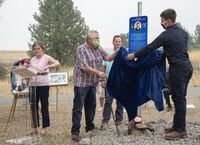 Rena Brown, Jim Mann, Byrne Bennett, and David Mann, 17, help unveil a new memorial plaque Friday, to honor Joe Mann, a World War II soldier who dove onto a grenade to save other members of his unit during the fight for the town of Best, Holland, in 1944. A crowd of relatives and friends gathered by a country road near Reardan, Washington, to see the unveiling. (Jesse Tinsley/THE SPOKESMAN-REVIEW)
Rena Brown, Jim Mann, Byrne Bennett, and David Mann, 17, help unveil a new memorial plaque Friday, to honor Joe Mann, a World War II soldier who dove onto a grenade to save other members of his unit during the fight for the town of Best, Holland, in 1944. A crowd of relatives and friends gathered by a country road near Reardan, Washington, to see the unveiling. (Jesse Tinsley/THE SPOKESMAN-REVIEW)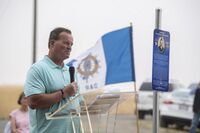 Byrne Bennett, a nephew of Pfc. Joseph Mann, speaks to a small crowd gathered beside a country road near Reardan, Washington Friday, Sept. 18, 2020 to see a new memorial plaque unveiled to honor Joe Mann, a World War II soldier who dove on a grenade to save other members of his unit during the fight for the town of Best, Holland in 1944. Mann’s death occurred during Operation Market Garden and he was given the Medal of Honor posthumously. The Daughters of the American Revolution helped to organize the tribute which is posted by the house where Mann grew up and where Mann relatives still live. (Jesse Tinsley/THE SPOKESMAN-REVIEW)
Byrne Bennett, a nephew of Pfc. Joseph Mann, speaks to a small crowd gathered beside a country road near Reardan, Washington Friday, Sept. 18, 2020 to see a new memorial plaque unveiled to honor Joe Mann, a World War II soldier who dove on a grenade to save other members of his unit during the fight for the town of Best, Holland in 1944. Mann’s death occurred during Operation Market Garden and he was given the Medal of Honor posthumously. The Daughters of the American Revolution helped to organize the tribute which is posted by the house where Mann grew up and where Mann relatives still live. (Jesse Tinsley/THE SPOKESMAN-REVIEW)By Kip Hall [kiph@spokesman.com](mailto:kiph@spokesman.com)[(509) 459-5429](tel:+15094595429)
To get to the boyhood home of Private First Class Joe E. Mann, you have to know where you’re going.
The rolling fields of wheat on the farm outside Reardan, reachable by dirt road, were where Mann learned to tinker with cars and fly kites with his eight siblings. The landscape is a reminder of how heroism can sprout from modest beginnings, said Byrne Bennett, Mann’s nephew.
“It’s kind of nice that this is a humble farm,” he said. “It shows that somebody can come from a place like this, and do something great.”
Visitors to that farm will now have a physical reminder of the sacrifice of Mann, whose exploits 76 years ago Saturday in war-torn Holland are told in a Congressional Medal of Honor citation. A group of about 50 friends, family and well-wishers gathered in the front yard Friday afternoon to dedicate a historical marker to Mann, made possible by the work of the local chapter of the Daughters of the American Revolution.
Bennett, who’s working on a book about his uncle that goes beyond the official account told by the military and taught to Dutch schoolchildren, offered visitors a glimpse of Mann before he became a war hero, diving onto a grenade to save six of his fellow soldiers attempting to beat back a German onslaught during Operation Market Garden.
“His dad was not very happy with some of Joe’s shenanigans,” Bennett said. “Like when he built a fire in the potato cellar, sending smoke billowing into the house, or when he threw a homemade explosive device into the iron smelting pot, blowing it to smithereens.”
Mann sustained a football injury that would later disqualify him from becoming a pilot in the Army Air Corps, like his brothers. He broke his collarbone and, true to form, stubbornly refused to leave the field, Bennett said. The metal plate left in to heal the bone kept him from passing a physical to fly.
Mann graduated from Reardan High School in 1941, and asked his father for permission to enlist in the Army. Instead of becoming a pilot, he trained to become a paratrooper, and was initially assigned to the 506th infantry regiment of the 101st Airborne Division, Bennett’s research found. That group of soldiers became immortalized in a book and later HBO miniseries, “Band of Brothers.”
But Mann drew a disliking from one of the commanding officers, and he was issued a transfer shortly before D-Day to the 502nd regiment. A pair of hernias sustained during a final training mission sidelined Mann before the invasion of Normandy, but he was cleared to return to action in the middle of September, as the 502nd was assigned to capture bridges necessary to enable an invasion of Nazi Germany from the north.
Bennett said despite Mann’s lack of combat experience, he was selected as lead scout for a squad of dozens of men as they approached a bridge over the Wilhelmina canal near Best, Holland. Heavy German fire killed or injured most of them, and in an attack on a German gun encampment Mann received multiple wounds to his arms.
The next morning, Sept. 19, during a counterattack, the Germans lobbed potato-masher grenades into a foxhole of injured men. Mann freed his arms and attempted to throw several out of the hole before they detonated. When the explosives piled up, Mann threw himself on the grenades to protect the injured men.
“Looking into his lieutenant’s eyes, he said, ‘My back is gone,’ and died,” Bennett told the crowd.
Many of the details came to Bennett from a speech intended to be given by U.S. Army Gen. Samuel Lyman Atwood Marshall at the dedication of the community center in Hillyard that bore Mann’s name, until it was demolished in 2017. Due to bad weather, the general never arrived to give the speech.
Marshall, a military historian, interviewed the men with Mann in that foxhole “in a Dutch cattle barn,” according to the speech. The men had surrendered to the Germans after Mann’s death, but were quickly rescued as the fast-moving British and American soldiers liberated the area just hours after Mann’s death.
“It was a story of valor untouched by any other episode I know of,” Marshall’s speech read.
That story is told in Holland to this day, said Rae Anna Victor, a local historian, author and member of the Jonas Babcock Chapter of the Daughters of the American Revolution, who organized the marker and ceremony Friday.
“Joe really is regarded as a true hero in Holland,” Victor said.
There are efforts underway to ensure that same regard is shown in Mann’s hometown. A plaque at the base of the American flag at Reardan’s City Hall recognizes Mann’s accomplishment, and his name is one of two Medal of Honor recipients from the area for whom the Mann-Grandstaff VA Medical Center in Spokane is named.
A nonprofit group called Reardan Heroes hopes to raise funds to build a 4½-acre memorial park honoring Mann and the town’s other veterans near Audubon Lake.
The marker dedicated on the farm that remains in Mann’s family is a step in the right direction for Bennett, who along with several other descendants accepted flags flown above the U.S. Capitol and nearby Fairchild Air Force Base in his uncle’s honor. As the sun peeked out from the smoke and shone on Mann’s boyhood home, the same day that Americans were urged to pause and reflect on those service members imprisoned or missing in action, Bennett said he hoped the piece would cause all to reflect on the sacrifices of those who fight for the country.
“I just hope people take the time to read it, and learn about him,” Bennett said. “And think about the things that he stood for. What he fought for.”
